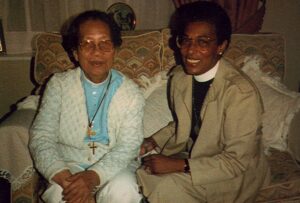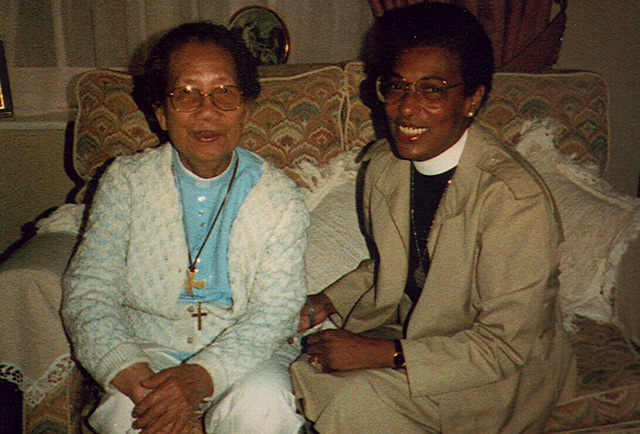
There are some who say that the first ordination of women to the priesthood in the Anglican Communion happened on July 29, 1974 in Philadelphia in The Episcopal Church. They are wrong.
Li Tim-Oi graduated from Canton Union Theological College, located on the southern coast of China, in 1938. She was a lay worker at All Saints Church in Kowloon, where she worked with the refugees who left mainland China during the Second Sino-Japanese War. Li Tim-Oi came to the attention of Bishop Ronald Hall, who sent her to Macau to work with refugees.
After six months, she returned to Hong Kong, where Bishop Hall ordained her a deaconess at St. John’s Cathedral. She then returned to Macau to take charge of the Anglican congregation there and continue working with refugees. When Hong Kong was invaded and occupied by Japan, Anglican priests could not travel to Macau because of its neutrality. There was no Anglican priest on Macau, but Li Tim-Oi, the deaconess, was there.
Bishop Hall, aware of Li Tim-Oi’s work in the community and in light of the extraordinary circumstance of Japanese occupation, came to the stunning conclusion that “God’s work would reap better results if she had the proper title” of priest. On January 25, 1944, Bishop Hall and Li Tim-Oi traveled to meet in a nearby town not yet occupied by the Japanese, and there Bishop Hall ordained Li Tim-Oi a priest. Not a woman priest. Not a temporary priest. Not a special priest. A priest. Like any other priest.
Bishop Hall told William Temple, the Archbishop of Canterbury, “I’m not an advocate for the ordination of women. I am, however, determined that no prejudices should prevent the congregations committed to my care having the sacraments of the Church.”
To Bishop Hall, the living sacrament was more important, by any measure, than the structures created by the church. Ordaining Li Tim-Oi wasn’t a justice issue about equality of women. But it was, for him, fundamentally a justice issue that his prejudice, as he himself described his stance on the ordination of women, should not keep the people in a war-torn place from having a priest.
Serving and meeting the essential needs of the people of God is always a matter of justice, ultimately. As Professor Scott MacDougall, the House of Deputies theologian says, “theology is not only thought but is always lived, making theology as much practical as intellectual.” Ordaining Li Tim-Oi was a deeply theological act precisely because it was so practical, so necessary to the people of God in that time and place.
Bishop Hall is described as having “a burning compassion for the less privileged” and those affected by social upheaval and unrest. He cared deeply about the poor and the equitable distribution of resources and assets, and this passion made him less critical of the Chinese revolution than some would have liked. When the structure was an obstacle to hope, Bishop Hall chose hope. Professor MacDougall says this about hope: “Maintaining hope in the eschatological future of God—the promised coming of the kingdom that Jesus preached—empowers us to work now with God to create conditions that look more rather than less like the promised kingdom of liberation, joy, and life.”
And isn’t that the choice we are called to make time and time again as the baptized members of Christ’s body? Choose hope, not death. Choose hope and be free to live a life centered in Christ. Choose hope and be part of the coming of the kingdom.
I don’t know if Bishop Hall suffered consequences for ordaining Li Tim-Oi. We do know that in 1947, he tried to get retroactive approval in canon law for the ordination, but he was not successful. But ultimately his far greater success was in choosing hope.
I wish I could have met and spoken with Li Tim-Oi – this amazing woman with a courageous heart who served under extraordinary circumstances. After the war, she gave up her license to function as a priest, but did not give up her orders. The foundation in the United Kingdom that bears her name reports that she made that decision under pressure from the “Purple Guard,” which it describes as “episcopal vigilantes.” Then, under pressure from the Red Guard, she suffered the loss of Christian community under Communist oppression and endured re-education.
The collect for today reads this way: Almighty God, who pours out your Spirit upon your sons and daughters: Grant that we, following the example of your servant Florence Li Tim-Oi, chosen priest in your church, may with faithfulness, patience, and tenacity proclaim your holy gospel to all the nations, through Jesus Christ our Lord, who lives and reigns with you and the Holy Spirit, one God, in glory everlasting. Amen.
It makes it sound like she was fine with her circumstances – it exhorts us to follow her example serving with patience and happiness. This characterization sounds hollow to me. I wonder, in particular, about the spiritual and emotional consequences of her decision, apparently made under pressure, to refrain from exercising her vocation as a priest, because I have seen those consequences in other contexts in our times.
Close to 15 years ago, a group called, ominously, the Lambeth Commission on Communion, released something called the Windsor Report, which was a study of what some termed the “problem” of the consecration of my friend Gene Robinson as bishop of New Hampshire. Their conclusion, in short, was that we Anglicans should have a covenant that would require us to privilege unity over justice. Or as least that’s how I read it. You’ll note that we don’t have an Anglican Covenant today, so I was not alone in this interpretation.
At the time, Bishop Ann Tottenham of the Anglican Church in Canada said something that stuck with me: “The real lesson derived from the story of the ordination of women is that when unity and fellowship become the first priority for the Church, the result is the endless postponement of decision-making and the inequitable treatment of those most closely involved with the issue.”
I think that Bishop Tottenham got it right. When unity and fellowship become the church’s first priority—when they are a higher priority than creating conditions that look like the promised kingdom of liberation, joy, and life—then we not only diminish the gifts of people like Li Tim-Oi, but we diminish our vision of the eschatological future of God. But when we choose hope and justice above patience and happiness, then we come closer to the reign of God.
In 2004, Canon Christopher Hall, the son of Bishop Ronald Hall, preached a sermon in the form of a letter to Li Tim-Oi on the occasion of the diamond jubilee of her priesting, as they termed it at St. Martin in-the-Fields in London. He concluded this touching sermon—he knew her well—by saying that his father’s epitaph applied equally to her: “She showed us how the Christ she talked about is living now.”
Let us go and do likewise. Amen.
This sermon was given by House of Deputies President Gay Clark Jennings at a meeting of the Executive Council of The Episcopal Church on January 24, 2021. It draws significantly on a sermon given by President Jennings at Church Divinity School of the Pacific on January 24, 2019, when she served as St. Margaret’s Visiting Professor of Women in Ministry and first worked with Professor Scott MacDougall. In August 2020, she appointed him as theologian of the House of Deputies.
Photo: The Rev. Florence Li Tim-Oi and Bishop Barbara Harris at the Lambeth Conference in 1988. Courtesy of the Diocese of Massachusetts.


